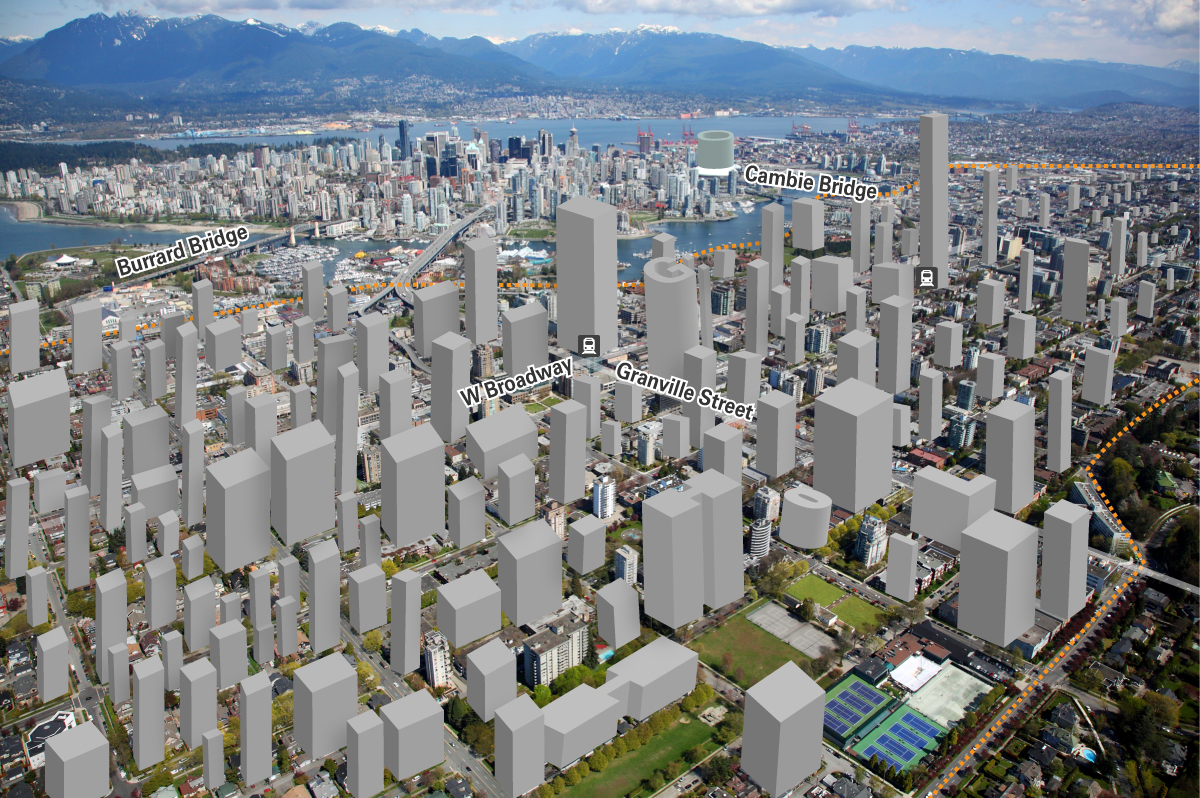Major changes coming to the Broadway Plan
Minimum frontage, towers-per-block, tenure and inclusionary zoning limits lifted
Goodman Report

Fresh from raising minimum building heights and density around urban and suburban transit stations through its Bill 47 intervention, the BC government is once again moving to override municipal planners and politicians to hasten construction of new housing.
New legislation to be tabled later this spring will remove a host of regulations currently blocking much-needed residential development along Vancouver’s Broadway corridor. In addition to lifting restrictions on building heights and density, the legislation will set aside minimum frontage requirements, the two-towers-per-block maximum, limitations on tenure, and inclusionary zoning policies, as well as some lesser development impediments. The Tenant Relocation Program will remain, but going forward will be financed by the province’s Rental Protection Fund.
The changes were recommended by a multi-stakeholder Broadway Task Force (including Goodman Commercial brokers Mark Goodman and Ian Brackett) which the provincial NDP struck in January to speed up approvals tied to the City of Vancouver’s 2022 Broadway Plan, the stalled 30-year vision to add badly needed housing, job space and amenities on close to 500 city blocks flanking the transit corridor.
“We can’t wait 30 years on Broadway. Renters and homebuyers need to see movement now.”
Against demand that built up during a lengthy public consultation, as well as the extraordinary senior-government investment in the Broadway SkyTrain line, the City of Vancouver still has a huge backlog of development proposals for the neighbourhood often called “Vancouver’s second downtown.” When the province learned late last year that not a single new project had started construction since the Broadway Plan’s approval, it quickly assembled the Broadway Task Force of real estate, development, and finance experts to try to break the logjam. Pointing to immigration and housing demand at record levels, a senior official in the BC Housing Ministry said, “We can’t wait 30 years on Broadway. Renters and homebuyers need to see movement now.”
Broadway Task Force recommendations, nearly all accepted by the government, include a dramatic increase in building heights and a corresponding reduction in development obstacles such as shadow restrictions and view cones. Noting that Bill 47 now permits 20-storey towers in suburban neighbourhoods across Metro Vancouver, Task Force members suggested that planners in the Broadway corridor should be taking their cues from the 60- to 70-storey towers that are increasingly common in Burnaby and Coquitlam. When provincial officials agreed, a surprised Mark Goodman said, “It’s nice to see the phrase ‘pace of change’ being used in the positive. It’s great to see government finally accelerating action to address the housing affordability crisis.”
The legislative climate change may also trigger an unprecedented level and pace of new investment. As co-chairs of a Broadway Task Force finance subcommittee, Goodman and Brackett are in advanced negotiations with a multinational investment consortium that has been watching the Vancouver market, but hesitating because of what they feared was overregulation. Consortium spokesman Jawad “Johnnie” bin Abadi, CEO of the Bahrain-based 20240401 Holdings LLC, said this week that his fund and two similarly large investors from Kuala Lumpur and Shanghai are looking to stake a world-class real estate play in a stable market, “and this is just the kind of certainty we need.”
“We think we can really speed up the City’s 30-year Broadway schedule,” bin Abadi said. “It should be possible to turn Broadway into the next Dubai in five to seven years.”
Although the government also agreed to a Task Force recommendation to remove low-income housing requirements, Goodman said the finance subcommittee has also linked bin Abadi’s investment group to a Vancouver-based cooperative housing society, which – with consortium support – has expressed an interest in participating in as many as one-third of new projects. A society spokesperson said they would prefer to partner on buildings that are 30 storeys or less, as their fee structure is more profitable when spread over a larger number of smaller buildings.
“We think we can really speed up the City’s 30-year Broadway schedule,” bin Abadi said. “It should be possible to turn Broadway into the next Dubai in five to seven years.”
The City of Vancouver, which was limited to providing support staff to the Broadway Task Force, has been mostly silent on the recommendations, but made clear that it will respond quickly to manage health and livability issues arising from the change in development style. For example, any building over 45 storeys – and especially those that block existing view cones – might be required to provide public access to roof-top viewing decks. The City said it could also waive licensing requirements for tanning salons to help area residents deal with the sunlight deficit that could result from this form of development.
Federal officials, who also had ex-officio representation on the Task Force, have been more enthusiastic, agreeing to modify immigration requirements and speed processing for individuals with architectural, engineering, and professional planning qualifications, giving special consideration to those with experience in New York, Hong Kong, Shanghai, Dubai or other capitals with extensive supertall building heights.
Please feel free to call Mark Goodman or Ian Brackett to learn more about how the new Broadway Plan will affect your property’s value …or not. Happy April Fool’s.